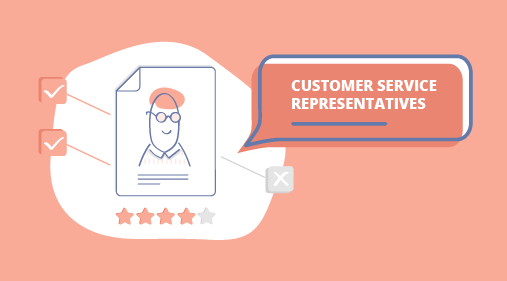How to assess customer service representatives
To assess customer service representatives, exercises that test troubleshooting, decision-making, communication, and comprehension skills are used during interviews. These exercises include hypothetical scenarios, essay questions, and verbal and written tasks.

The following exercises will help you assess customer service or customer support representatives in your interviews. Modify them to meet your specific needs.
Contents
What do customer service or support representatives do?
Customer service or support representatives are usually the first point of contact for customers. They answer questions, diagnose problems and provide solutions to customer issues. This position’s duties vary greatly depending on the industry, but there are some skills all successful customer service or support representatives should share:
- Troubleshooting: Curiosity and drive to get to the root of a problem.
- Decision-making: Confidence to make sound judgments.
- Communication: The ability to effectively communicate abstract topics.
- Comprehension: The ability to interpret customer intentions, despite what they are asking/saying.
Potential to learn fast and grow into other roles often make good entry-level customer service/support representatives excellent long-term team members. The best customer service/ support representatives serve as consultants to customers. They work to help customers resolve issues as quickly as possible.
Ways to assess customer service/support skills in interviews
Use a combination of interview questions that include hypothetical scenarios to test customer service/support representative skills and multiple-choice and essay questions to test candidates on products unique to your company.
Here are some interview exercises for customer service/support representatives to help you assess their skills, including what to look out for. You can use these skills assessments during first, second or final-round interviews. Keep in mind that there are no right or wrong answers. In customer support, it’s the process of arriving to a solution that matters the most.
1. Troubleshooting skills assessment
Exercise: I’m seeking technical help. I turn to you and say, “My cell phone is broken. How do I fix it?” How would you go about troubleshooting the problem?
What to look for: Most people have used cell phones, so this exercise is a simple and relatable way to test candidates’ abilities to ask questions and diagnose problems. Here are some responses to look for:
- What’s the exact issue you’re having with your cell phone?
- When did this issue start?
- What is the model of the phone?
Red flags: Watch out for hesitance or for jumping to conclusions too quickly. Candidates who don’t address the problem, seem nervous or aren’t curious about the issue may not have the troubleshooting skills required for a customer support role.
2. Decision-making skills assessment
Essay answer: Our company offers a one-month free trial of [XYZ] product. A customer is on the last day of their trial, and they are requesting another free one-month trial of the product before committing to a purchase. Do you reject the request or grant the customer an extension?
Explain your answer in less than 100 words: _____________________________________.
What to look for: It’s up to you to decide if there’s a right or wrong answer here. In general though, any position could be correct as long as the candidate defends it with logical criteria and delivers their reasoning with tact. Look for signs that candidates carefully considered the issue. Here are some criteria they might list as reasons for their decisions:
- Granting the request to maintain a positive company brand reputation.
- Rejecting the request based on asking whether there’s a company policy that prohibits trial extensions.
- Granting the request with the hope that the customer will purchase the product.
You may have relevant articles on your customer support blog that already cover this issue. If that’s the case, bonus points go to candidates who’ve researched your company thoroughly enough to cite your blog and provide your official answer.
3. Communication skills assessment
1. Verbal exercise: You are a customer service/support representative employed at a computer store. An irate customer approaches your desk, demanding to know why the laptop they just purchased is running so slow. How do you respond?
2. Written exercise: Describe in fewer than 75 words a hobby or topic you’re deeply interested in. Explain it to me as if I know nothing about it.
What to look for:
- Verbal exercise: Candidates who are immediately attentive and show empathy for the customer’s frustrations will stand out. “I’m sorry you’re experiencing this issue. Can I take a look at your computer if you have it with you?” is an appropriate response in person.
- Written exercise: Some businesses handle all customer support queries via email or help desk software. Look for candidates who can succinctly describe in writing something they know very well, like a hobby or a field of study.
Red flags: Candidates who visibly shut down during the verbal exercise may have difficulty handling customer support queries. For the written assignment, candidates who use jargon, exceed the 75-word limit or struggle with writing clearly may end up confusing customers.
4. Comprehension skills assessment
Exercise: Start by providing a brochure of your company product’s features. Here’s an example using Workable’s features. The brochure could look something like this:
Workable features:
-Posts to 15+ job boards.
-Offers a sourcing tool called People Search.
-Can create a branded careers page.
Ask your candidates to study these features and then poll them with a sample customer query:
A potential customer asks you if your product integrates with HR software that powers careers pages. It does not. How do you respond?
What to look for: This question will reveal your candidates’ abilities to understand your product and your customer’s needs. Look for responses like, “We don’t integrate with X but our product offers branded careers pages. Here’s a support link to what they look like.”
Red flags: The main red flag is responding with “No, it does not integrate.” A flat-no response indicates that candidates did not accurately comprehend the customer’s problem or your product’s features and are not trying to help customers achieve the goal that their question reveals.
Frequently asked questions
- What is a customer service assessment test?
- A customer service assessment test is an examination designed to evaluate how well a job applicant would fit the company's needs and the role of a customer service representative. It assesses the candidate's skills, knowledge, and abilities relevant to customer service.
- What is asked in an online assessment test?
- An online assessment test is designed to evaluate a candidate's skills, knowledge, or learning abilities. It may include numerical reasoning, inductive logical thinking, and verbal reasoning assessments to determine how well a candidate will perform in a specific role.
- How do I pass a customer service assessment test?
- To pass a customer service assessment test, one needs to focus on self-assessment traits, cognitive abilities, and job-related skills. Practicing with a call center assessment test can significantly improve the abilities and skills required for a customer service position.
- How can customer service representatives be assessed during interviews?
- Customer service representatives can be assessed during interviews through exercises that test their troubleshooting, decision-making, communication, and comprehension skills. These exercises can include hypothetical scenarios, essay questions, verbal and written exercises, and comprehension skills assessments.
- What are some red flags to watch out for during these assessments?
- Red flags during these assessments can include hesitance, jumping to conclusions too quickly, lack of curiosity, nervousness, inability to communicate clearly, and failure to understand the customer's problem or the product's features.




